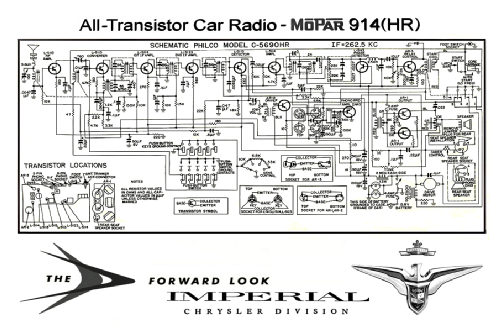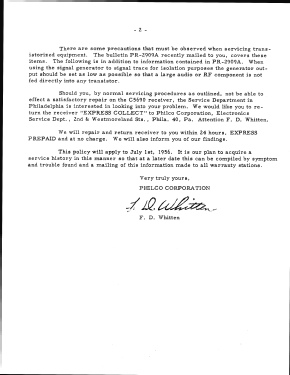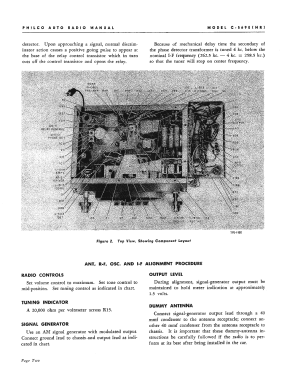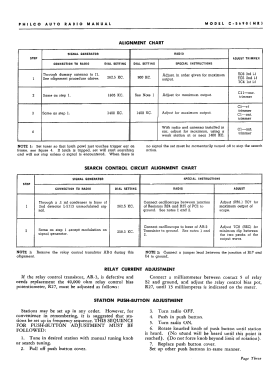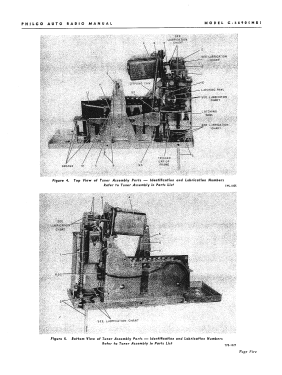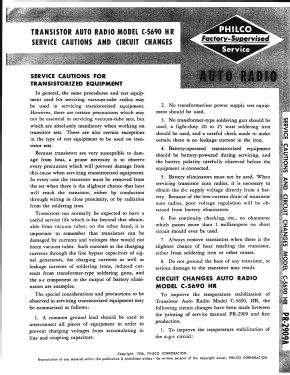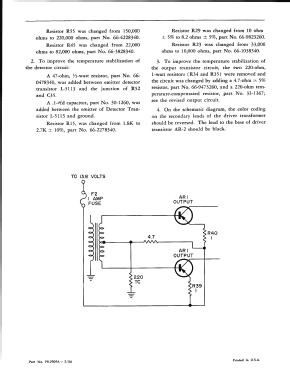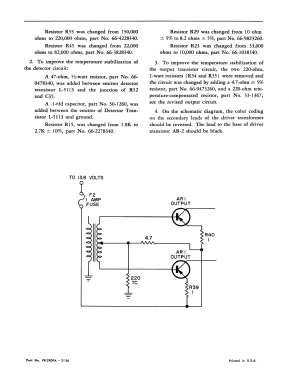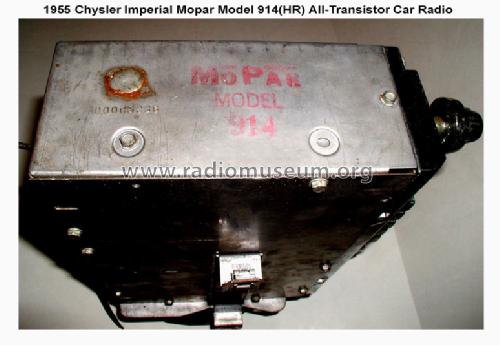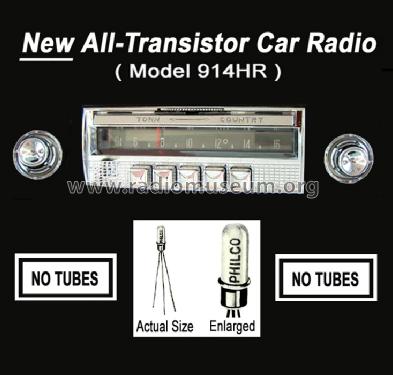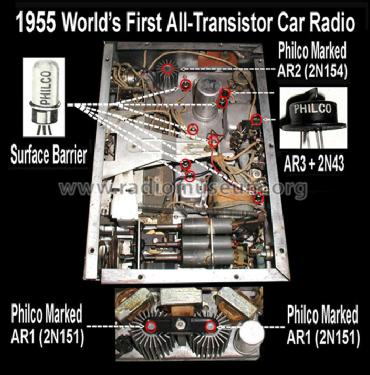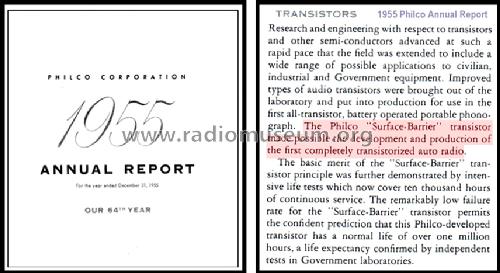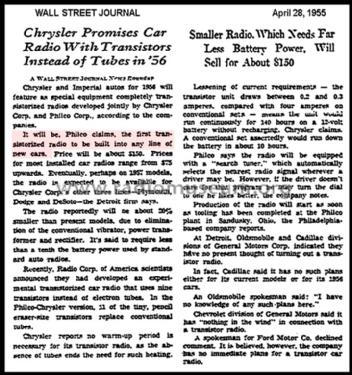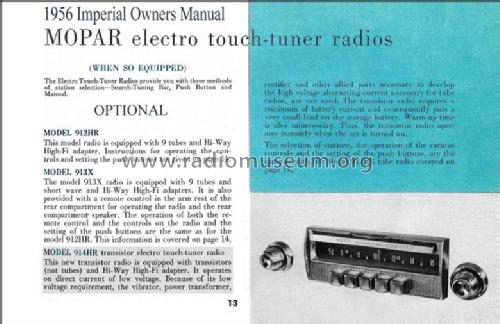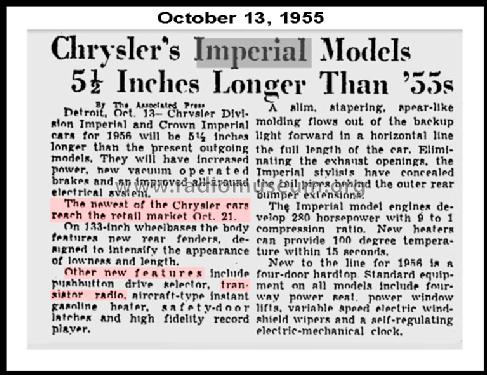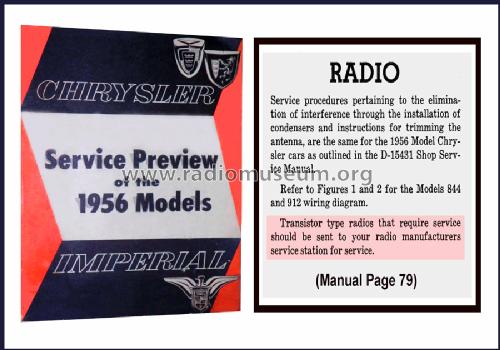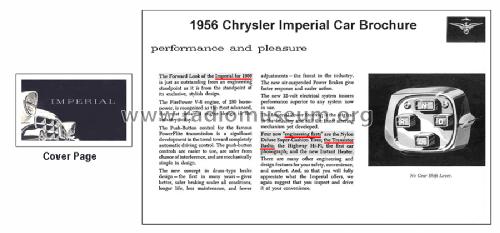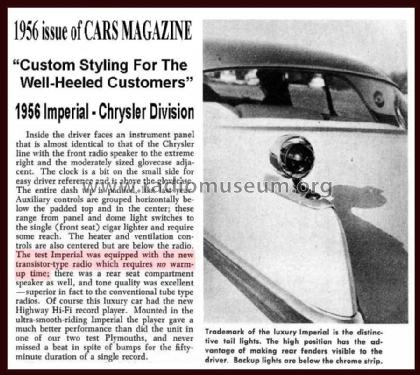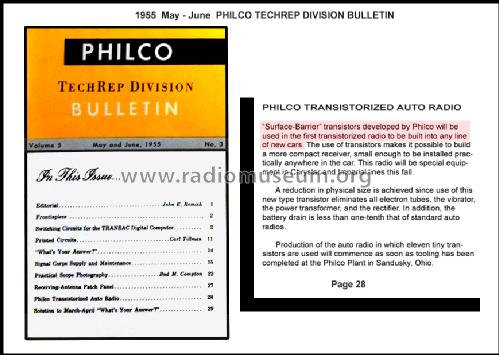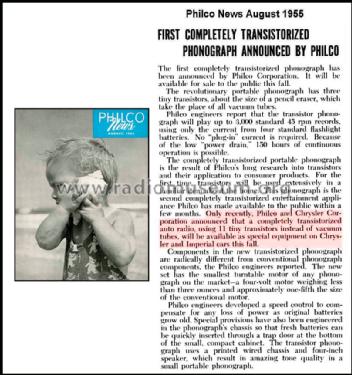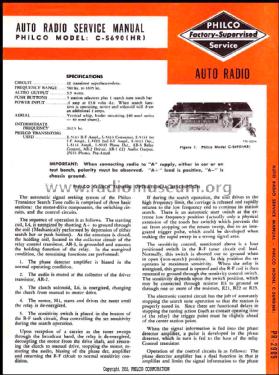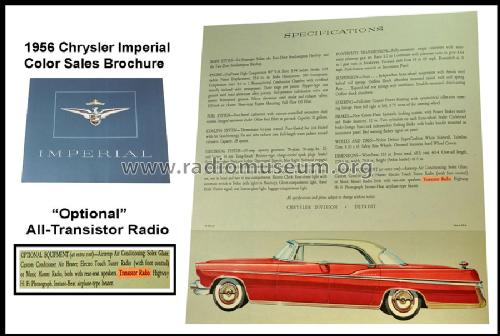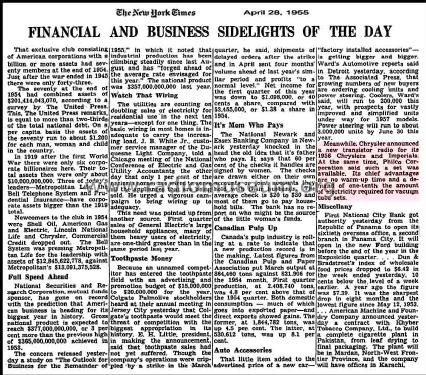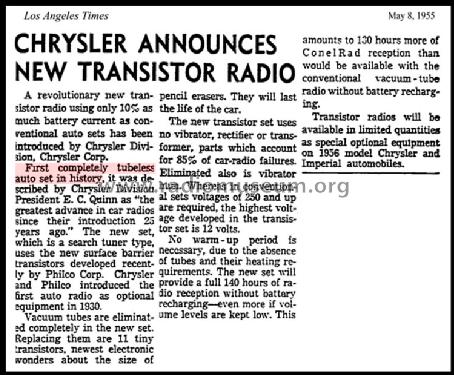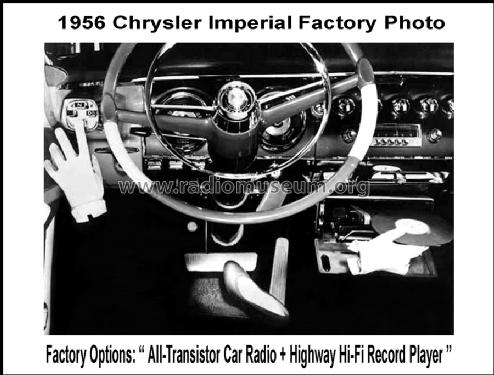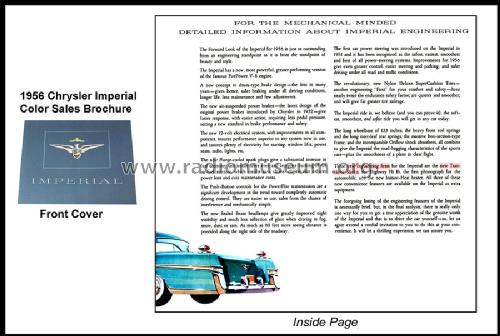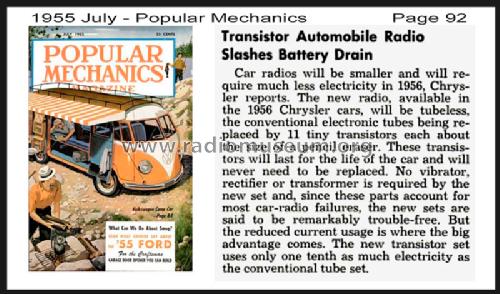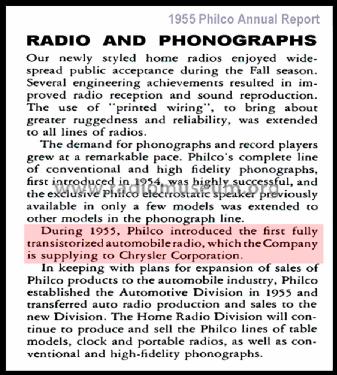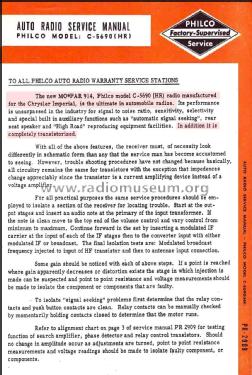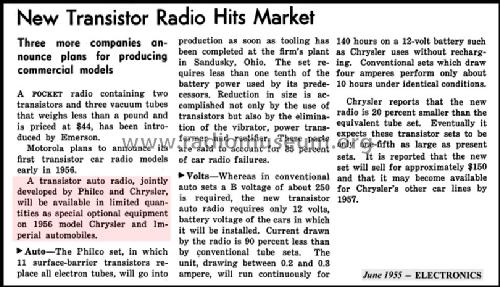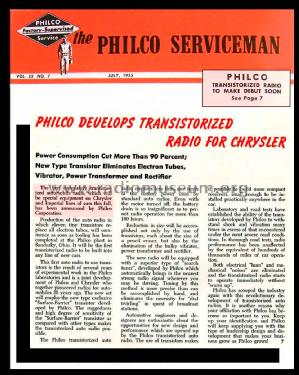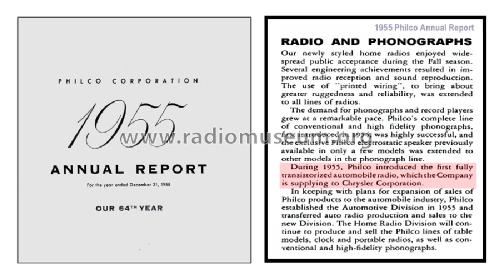Mopar 914-HR Ch= C-5690HR
Philco, Philadelphia Stg. Batt. Co.; USA
- Produttore / Marca
- Philco, Philadelphia Stg. Batt. Co.; USA
- Anno
- 1955/1956
- Categoria
- Autoradio, eventualmente con registratore a cassette o giradischi
- Radiomuseum.org ID
- 148671
Clicca sulla miniatura dello schema per richiederlo come documento gratuito.
- Numero di transistor
- 12
- Principio generale
- Supereterodina con stadio RF; ZF/IF 262,5 kHz; 3 Stadi BF
- N. di circuiti accordati
- 6 Circuiti Mod. Amp. (AM)
- Gamme d'onda
- Solo onde medie (OM).
- Tensioni di funzionamento
- Batteria di accumulatori, per tutto (es. autoradio, radio amatoriali) / 12 Volt
- Altoparlante
- AP magnetodinamico (magnete permanente e bobina mobile)
- Materiali
- Mobile di metallo
- Radiomuseum.org
- Modello: Mopar 914-HR Ch= C-5690HR - Philco, Philadelphia Stg. Batt
- Forma
- Chassis o in scatola da montaggio
- Dimensioni (LxAxP)
- 13 x 3 x 8 inch / 330 x 76 x 203 mm
- Annotazioni
-
This Philco Model C-5690 HR was the First ALL-TRANSISTOR car radio. It was developed in 1955 and was used in the 1956 line of Chrysler Imperial cars as an option. The Philco C-5690HR is Philco's name but Chrysler names it "Mopar 914HR" with its own numbering system of radio identification - which includes also other manufacturers like Motorola. For the transistor replacement: We believe that L-5113L (or OC44) and L-5114L (or OC45) can also be used for the ones without L at the end.
The Philco Model C-5690 HR (Mopar 914HR) All-Transistor car radio had used (12) transistors in its circuitry, which one of the transistors were used as a "phono pre-amp", for customers who also ordered the "Optional" Highway Hi-Fi in-car record player. The letters "HR" that is printed after the model number, stands for "High Road" and contains this extra or twelfth (2N43) transistor in its circuitry. And if the customer did NOT order this "Optional" Highway Hi-Fi in-car record player, then there would be a total of (11) transistors in its circuitry.
The Philco Model C-5690 HR (Mopar 914HR) All-Transistor car radio, was being produced by Philco in the Fall of 1955, for the "NEW " 1956 Chrysler and Imperial car models. Chrysler and Imperial 1956 car models went on sale and was available in its car dealership showrooms, on October 21st 1955. And the Philco Model C-5690 HR (Mopar 914HR) All-Transistor car radio was made an "Option" on its 1956 Chrysler and Imperial car models, for a price of $150.00. Chrysler Corporation had decided to discontinue this All-Transistor car radio option, at the end of the 1956 car selling season.
- Prezzo nel primo anno
- 150.00 US
- Fonte esterna dei dati
- Rick Hirsh
- Autore
- Modello inviato da Ernst Erb. Utilizzare "Proponi modifica" per inviare ulteriori dati.
- Altri modelli
-
In questo link sono elencati 4120 modelli, di cui 2227 con immagini e 3768 con schemi.
Elenco delle radio e altri apparecchi della Philco, Philadelphia Stg. Batt. Co.; USA
Discussioni nel forum su questo modello: Philco, Philadelphia: Mopar 914-HR Ch= C-5690HR
Argomenti: 1 | Articoli: 1
Chrysler and Philco had developed and produced the "World's First All-Transistor car radio in 1955". This "Breaking News" was first announced in the April 28th 1955 Wall Street Journal newspaper. Chrysler had made this All-Transistor car radio Mopar model 914HR available as an "Option" in the fall time of 1955, for it NEW line of 1956 Chrylser and Imperial model cars. Chrysler had used the Mopar model 914HR, which was also Philco's model C-5690. Philco had originally re-designed the Mopar model 912HR, which was a 5-push button "Town and Country" AM radio, with an electronic signal-search touch bar tuning and contained 9 vacuum tubes inside. Philco decided to use this "exact" same radio and re-design the inside circuitry with (11) transistors and NO vacuum tubes, making it the Chrysler Mopar 914HR or Philco C-5690 All-Transistor car radio model. And if the customer had ordered Chryler's "optional" Highway Hi-Fi in-car record player, then Philco had added an extra transistor in its circuitry, which was used as an phono pre-amplifier (2N43), and making it a total of (12) transistors inside. The letters "HR" that is printed after the model number, stands for "High Road" and contains this extra or twelfth (2N43) transistor in its circuitry. This car radio's circuitry also included the "famous" Philco Surface Barrier Transistors, which were the World's First high-speed high-frequency transistors that were developed in 1953 by Philco, and could be designed for computer usage.
The Philco Model C-5690 HR (Mopar 914HR) All-Transistor car radio, was being produced by Philco in the Fall of 1955, for the "NEW " 1956 Chrysler and Imperial car models. Chrysler and Imperial 1956 car models went on sale and was available in its car dealership showrooms, on October 21st 1955. And the Philco Model C-5690 HR (Mopar 914HR) All-Transistor car radio was made an "Option" on its 1956 Chrysler and Imperial car models, for a price of $150.00.
This "Rare" highly engineered All-Transistor car radio, was short lived and by the end of 1956, Chrysler had discontinued this car radio model. Chrysler had decided that it would no longer make All-Transistors car radios available for its car models, during the rest of the 1950's. And Chrysler instead decided to use "Hybrid" car radios, which contained BOTH transistors and vacuum tubes inside.
I have also made a YouTube video, which shows this 1955 Philco All-Transistor car radio. This video also contains some Chrysler dealership promotional film clips, on introduction of some of its NEW Standard and Optional equipment, that became available in the fall of 1955, for its NEW line of 1956 Chrysler and Imperial car models. And finally, there is a "Rare" look at the radio's chassis, which shows all of its transistors and locations, is shown near the end of the YouTube video film.
![[Image: PhilcoAll-TransistorcarradioYouTubevideothumbwheel.jpg]](http://i1247.photobucket.com/albums/gg632/electricalengineer1958/PhilcoAll-TransistorcarradioYouTubevideothumbwheel.jpg)
YouTube Video Link ...... Just "Click" on it
Thanks and I hope that everyone enjoys the above info and YouTube video.
Rick Hirsh, 11.Oct.12
